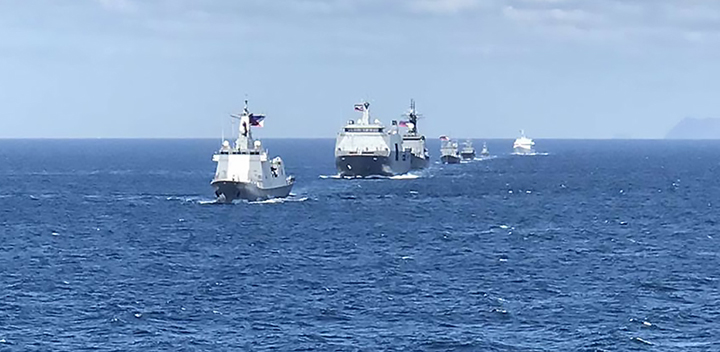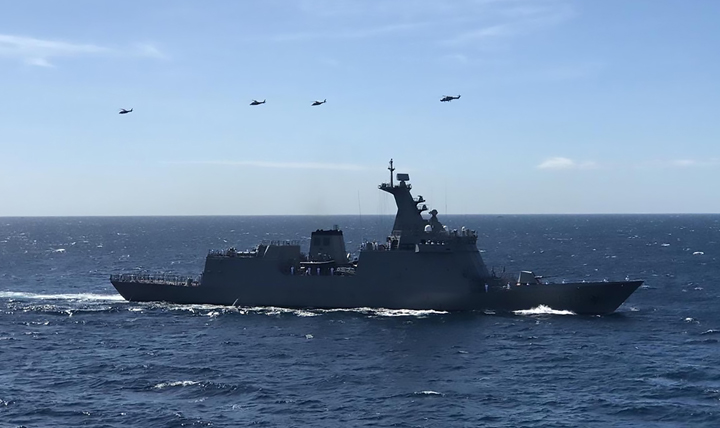THE military has vowed to sustain its maritime patrols in the West Philippine Sea (WPS), and assured Filipino fishermen of protection despite China’s recent authorization to the Chinese Coast Guard to fire at vessels in territories Beijing disputes.
“The Philippine Navy will continuously patrol and provide naval presence in the West Philippine Sea,” Navy Flag Officer in Command Vice Admiral Giovanni Carlo Bacordo told the BusinessMirror. “The Philippine Navy also monitors the fishermen’s activities through our littoral monitoring stations.”

The Philippines, along with its neighbors, has recently raised serious concerns over Beijing’s Coast Guard law that mandated its Coast Guard to fire on foreign vessels and smash structures of other countries on islands that it is claiming.
Specifically, the law authorized the Chinese Coast Guard to “take all necessary measures, including the use of weapons, when national sovereignty, sovereign rights and jurisdiction are being illegally infringed upon by foreign organizations, or individuals at sea.”
It also empowered its Coast Guard to demolish other countries’ structures that were built on reefs and islands being claimed by Beijing and to seize or order foreign vessels illegally entering its territorial waters to leave.
Locsin, Tolentino weigh in
For his part, Sen, Francis Tolentino had suggested that the Duterte administration enlist support of other countries to join the Philippines in taking a common stand protesting China’s recent passage of a new Coast Guard law that heightens the risk of armed confrontation in the West Philippine Sea.

Besides backing the filing of a diplomatic protest by Foreign Affairs Secretary Teodoro L. Locsin Jr., Tolentino added that “all affected nations can hold an informal meeting and agree to file the Joint Resolution affirming a common stand among Asean” that the Philippines can initiate.
In a radio interview, he added that even as foreign ministers in the regional bloc consult on their next moves, President Duterte could also “talk with his China counterpart.”
In a privileged speech, Tolentino reminded his peers that the National People’s Congress of the People’s Republic of China recently passed a law, called the Coast Guard Law of the People’s Republic of China, taking effect on Monday.
In his speech at the Senate, Tolentino said he was compelled to bring up the issue in plenary “because a lot of our fishermen are out there. Some of our fishermen, including those from Zambales, Mindoro, Palawan, Batangas and Cavite, will go fishing not knowing the existence of this newly passed law by the National People’s Congress of China….’”

The senator warned that China’s law is “very specific,” noting that “it specifies the circumstances under which the different kinds of weapons—handheld (I’m referring to pistols or rifles), shipborne missiles, or airborne coming from planes—can be used.”
Tolentino said: “…The law further provides that the Chinese Coast Guard is empowered to set up temporary exclusion zones. These are lockdown zones as needed to stop other vessels and personnel from entering.”
The law, seen as having been crafted to reinforce China’s expansive claims in the South China Sea (SCS) and directed against its neighbors, including the Philippines, Vietnam and Malaysia whose waters it contests due to its overlapping maritime claims, was branded by Secretary Locsin as a “verbal threat of war.”
He pointed out that if it is not challenged, it is tantamount to a submission. He has filed a diplomatic protest over the matter.
‘Brutal way’
While the law raises the specter of a direct confrontation in the SCS, it also allowed the Chinese Coast Guard to take a more decisive and “brutal” way of dealing with Filipino fishermen, some of whom had experienced intimidation and harassment from its cutters in the past in the WPS.
Chinese Coast Guard vessels have in the past bombarded Filipino fishermen with water cannons in the Scarborough Shoal to shoo them away, while harassing re-provisioning operations by the Philippine military for its troops manning islets and features in the WPS.
A combination of Chinese Coast Guard ships, maritime militia vessels and People’s Liberation Army (PLA) Navy warships prowls the WPS and has been guarding the Scarborough Shoal.
Bacordo said the Navy will not make any changes in its maritime operations in the WPS, especially in the deployment of its assets and its patrols, notwithstanding the new Chinese edict.
“The Philippine Navy will maintain its current deployment in the WPS—ships and aircraft,” he stressed, adding the Navy will “continuously conduct maritime and air patrols, and regularly rotate and re-provision its assigned personnel in the Philippine-occupied features.”
Guidance
When asked how they see the law and its effect on their maritime operations in the country’s territory that China disputes, Bacordo said they will adhere to the “guidance of higher headquarters and the national government.”
In the meantime, the Navy, especially its sailors and Marines deployed under the Western Command, the military’s area command that has operational jurisdiction over Palawan and the biggest part of the WPS, will maintain the “status quo.”
“The Philippine Navy will maintain the status quo, challenge all vessels, document and take pictures, and submit reports to higher authority,” Bacordo said.
“The Philippine Navy forces will remain vigilant and abide by the existing international laws,” he added.
Being a part of a military from a civilized country that subscribes to international norms, laws and regulations, Bacordo said they support initiatives that promote “cooperation and prevent escalation of tension between claimant countries.”
In the aftermath of the law’s operation, the Navy is monitoring the activities of PLA Navy ships and Coast Guard vessels in the WPS through its littoral monitoring stations and information from local fishermen.
Bacordo said the Chinese Coast Guard maintains its regular presence in the South China Sea, even after the enactment of the China Coast Guard Law.
With earlier report by Butch Fernandez



